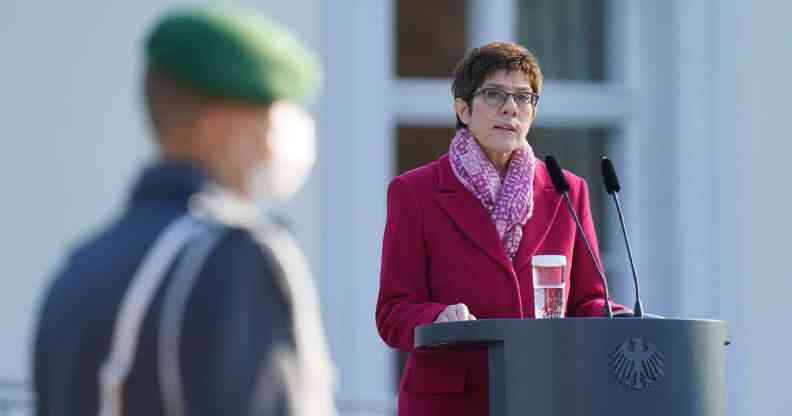Germany votes to compensate LGBT+ soldiers for past discrimination

German Defence Minister, Defense Annegret Kramp-Karrenbauer. (Getty/ Sean Gallup)
Germany’s parliament has voted to compensate queer soldiers for historical discrimination, but campaigners say the legislation doesn’t go far enough.
On Thursday (20 May), parliament voted in favour of the legislation, approved by the cabinet in November, 2020, which grants compensation to LGBT+ people who faced discrimination and harassment while serving in the Bundeswehr, Germany’s armed forces.
Until 2000, a policy which said LGBT+ military personnel should be viewed as a “security risk” effectively banned queer people from the armed forces in Germany.
According to Jurist, many LGBT+ personnel were denied promotions, discharged from service or even convicted because of their sexual orientation or gender identity.
The new legislation sets aside a fund of €6 million to provide compensation of €3,000 to each employee who faced discrimination for being LGBT+, and will also allow them to have any convictions expunged from their records.
Last year Annegret Kramp-Karrenbauer, Germany’s defence minister, said: “I know that we can’t make up for the personal injustice they suffered but, with the lifting of verdicts and the payment of lump-sum compensation, we want to send a signal of redress.”
Following the parliament vote on Thursday, Kramp-Karrenbauer tweeted that the measure would show that the German military “is more open, more colourful and more tolerant today”.
https://twitter.com/akk/status/1395453260912283649
Although the legislation is a step in the right direction, campaigners have said that it “does not go far enough”.
Patrick Dörr of the Lesbian and Gay Association in Germany (LSVD) said in a statement that the law is “limited to symbolic compensation and does not cover all discrimination that has taken place”.
The organisation is calling for greater recognition of the discrimination and harassment that LGBT+ military personnel continued to face, even after the ban was lifted.
Dörr continued: “The law only covers discrimination that took place before 3 July, 2000. On this day, a service regulation that allowed for discrimination against queer soldiers was repealed.
“However, the repeal of a service regulation is not synonymous with the end of a systematic, state-legitimised practice of discrimination that has lasted for decades.”

